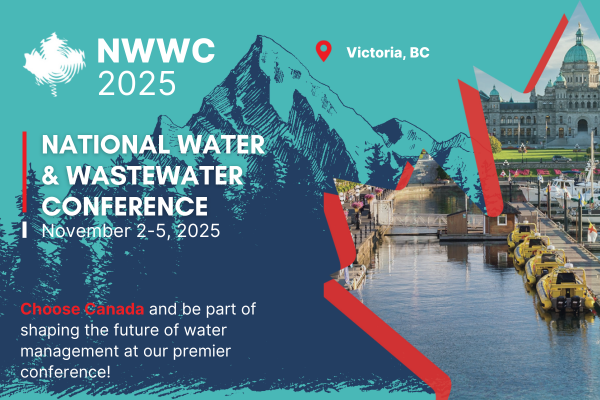I just got back from the AWWA’s ACE event in Denver. It was my first trip to the US since their election. All seemed fairly normal. I had no troubles with my travels – passing US Security in Toronto, and the AWWA event was as spectacular as ever. Almost every American I met apologized for the current situation and expressed their love, and respect, for Canada. The only difference was the very noticeable lack of Canadians. I, like most Canadians, have been limiting my travels to the US. Our annual family ski trip to New Hampshire slid north to Quebec – and we had a terrific vacation! I backed out of a few other events that were not critical, but for me, attending ACE was very important to maintain our relationship with the AWWA. I will be doing the same this fall when I attend WEFTEC in Chicago and renew our bonds with WEF.
|
There's never been a better time to strengthen Canadian partnerships and relationships. Plan to attend this years National Water and Wastewater Conference in Victoria, BC.
We often refer to this committee as our “non-technical technical committee” as it focuses on the wider management issues facing utilities – including financing, asset management, infrastructure planning , resilience, workforce development and more. A very prolific group, in the last few years they have created:
- Towards a Sustainable Utility – A Guidance Document
- Workforce Development – Guidance and Checklists
- Natural Infrastructure – National Survey and Position Paper
The committee is now focused on the concept of “Resilience” – what does this term mean, how do build resilience into our infrastructure planning, how do we avoid, or at least mitigate, the effects of infrastructure failures? The committee explores these questions at the National Conference and webinars.
Meanwhile, the committee makes regular submissions to the federal government in response to infrastructure policies, funding programs and the federal budget.
|
ES&E Magazine
The Environmental Protection Agency is reevaluating regulatory drinking water limits for types of PFAS known as Gen X (PFHxS, PFNA and HFPO-DA), but will maintain limits and extend compliance deadlines set for PFOA and PFOS, two of the more common forms of the “forever chemicals.”
|
ES&E Magazine
With the Great Lakes right at its doorstep and a web of rivers and streams crisscrossing its landscapes, it’s easy to believe that Ontario has all the water it needs. However, many areas in the province face challenges in managing water sustainably.
|
The Government of Canada recently announced an investment of $6.8 million for 20 projects across the country through the Flood Hazard Identification and Mapping Program, as part of Canada’s National Adaptation Strategy.
|
 
|

|

The federal Liberal minority government has passed proposed legislation tied to Prime Minister Mark Carney’s major infrastructure fast-tracking program in the House of Commons.
Bill C-5 must still receive Senate approval before it can be proclaimed as a law and enable the government to begin accelerating new projects deemed to be of national significance.
The government has stated that the program will focus on approving proposals that enhance Canada’s economic independence and have support from Indigenous communities.
Once a project is deemed in the national interest, a new federal major projects office will be tasked with setting a single set of conditions to be met, streamlining federal oversight. However, the government has yet to clarify how it will balance expedited approvals with its duty to consult Indigenous communities.
The Bill primarily addresses critical mineral corridors, ports, nuclear energy facilities and pipelines, so has little direct impact on our members. However, with fast tracked projects, municipalities may need to be more diligent about watershed implications.
|
The Canadian Standards Association has recently published the Ontario wastewater management system. The purpose of this Standard is to provide requirements for the quality and environmental management of wastewater systems. It defines a risk-based process for decision-makers responsible for the operation, maintenance, and management of wastewater systems.
|
ESE Magazine
Ed Houghton’s nine days on the ground in Walkerton are now something of a blur. But the emotion remains vivid as he recalls becoming the de facto spokesperson for a tragedy that would grip the nation — informing the public and media, one death at a time, of the devastating toll of E. coli-contaminated drinking water.
Note: The National Water and Wastewater Conference will feature a session on Walkerton 25 years later - specifically how it has led to the development of water quality safety planning across the country.
|
 
|

|

USA Today
Water pouring from the faucets of at least 42 million Americans is contaminated with unacceptable levels of “forever chemicals,” according to a USA TODAY analysis of records the Environmental Protection Agency released June 2.
|
A bill requiring wet wipe manufacturers to label their products as non-flushable has passed in the U.S. Senate Commerce Committee and is now headed for debate in Congress.
|
Water Canada
York Regional Council approved the ‘Construction Manager at Risk’ (CMAR) contract model to deliver components of the York Region Sewage Works Project. The CMAR approach assists with meeting the 2028 implementation timeline by supporting overlapping design and construction phases and allowing construction to advance with early material procurement.
|
MPR News
The Trump administration announced last month it plans to uphold limits on the two most common types of "forever chemicals" in drinking water. But it plans to delay the deadline for water utilities to meet those standards and roll back limits on four other potentially harmful PFAS chemicals.
|
Connexion
The city of Toulouse has confirmed it will once again increase drinking water prices by 42% this summer as part of plans to combat drought. Authorities have confirmed that the higher rate will begin from June 1, and last until at least October. After that, rates will drop by 30%. The plan aims to reduce water usage city-wide, to prevent (or at least, to prevent worsening) drought conditions.
|
The Guardian
The Spanish government is preparing a law that will oblige wet wipe manufacturers to cover the costs of cleaning huge wads of their product from the country’s clogged-up sewers and water-treatment plants.
|
 
|

|
 |











